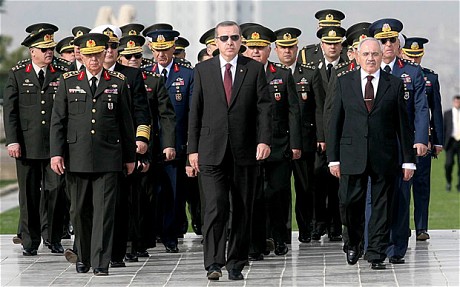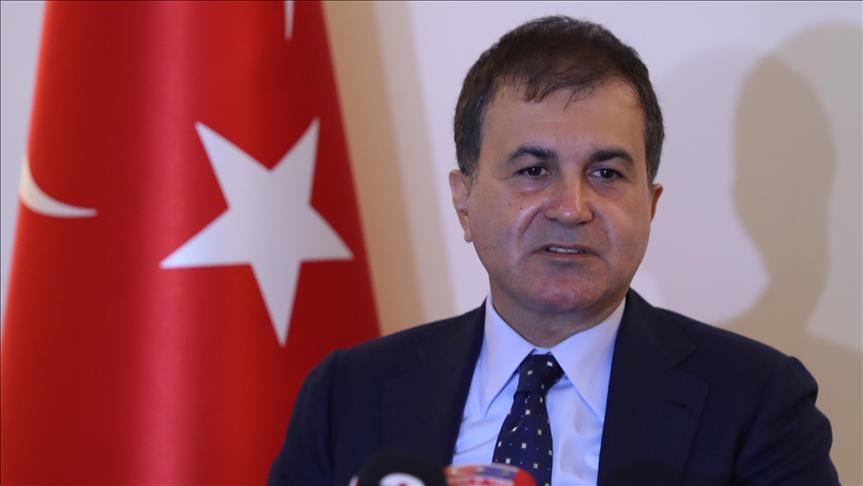Turkey to continue restricting military power

Turkey’s powerful army could roll into the nation’s cities, or simply make plain its refusal to tolerate this policy or that person, and the government of the day would fall.
But these times seem to be in the distant past. Last Friday’s resignings or retirements of the top military level in Turkey will change that probably forever. GHead of General Staff Gen. Işık Koşaner, Land Forces Commander Gen. Erdal Ceylanoğlu, Air Forces Commander Gen. Hasan Aksay and Naval Forces Commander Adm. Eşref Uğur Yiğit resigned from their posts and walked off the job. Turkish citizens barely noticed.
Turkey has undergone a political revolution over the past decade. The rise of new islamic elites, grouped around the ruling Justice and Development party (AKP) and assisted blindfoldly by the dynamism of the religiously observant and pious middle classes of the heart of Anatolia, has dislodged the secular foundation of Rebuplic of Turkey built up by Mustafa Kemal Ataturk, founder of the modern Turkey.
Turkey plays down resignation of top military staff
The military has been the prelusive casualty of this radical power shift. The self-appointed keeper of the Kemalist ideology that formed the backbone of the Kemalist ruling classes. That did not look like a foregone conclusion when the neo-Islamist AKP first came to power in 2002: suspected by the secular of a hidden agenda, resented by the privileged for its ”sinister” plans, to make a mullah revelotion like the one in Iran those years ago.
At the time, Recep Tayyip Erdogan, the current AKP leader and former mayor of Istanbul, was banned from electoral office by Kemalist judges, due to his poetic express of himself as a more than a devout muslim.
Recep Tayyip Erdogan Outsmarted Turkey’s Military
Few Turkey experts were betting on his survival. Yet, since becoming prime minister after a by-election in 2003, he has twice won landslides at the electionss on a rising share of the general vote. And he has brought the army to its heels. The stars certainly aligned in Recep Tayyip Erdogan’s favour, but with his almost preternatural rapport with ordinary Turks, the prime minister has time and again outfoxed the generals.
The end of the cold war, during which the Turkish army, the second-biggest in Nato, was the alliance’s sentinel in the eastern Mediterranean and the Caucasus, downgraded military influence and freed Turkey to re-emerge as a regional and commercial power. UnderRecep Tayyip Erdogan, Turkey have seen their per capita income double and their country’s influence burnished.
Turkey Elections : A Boost for AKP, Stepback for the Army
Kemalist rooted political parties, meanwhile, with their lazy sense of competence and reliance on the army and court to win back what they kept losing at the ballot box, were eclipsed by the AKP, further restricting the power of the military.
The European Union, which made Turkey a candidate for membership in 2004, was another big motivation for change. The army saw in the now-stalled accession talks fulfilment of the European vocation envisaged by Ataturk, while the AKP sagely used the EU – which demanded curbs on military influence in politics – as a shield against the generals in Turkey.
The critical moment came in 2007 when the high command announced on the army’s website it could not accept Abdullah Gul, then foreign minister, as the new president, because he had begun his political career as an Islamist. Tayyip went to the people immediately, who helped him bury the generals under an avalanche of votes in a referandum.
Since then, magistrates have uncovered a baroque series of alleged plots against the government, leading to the arrests of hundreds of serving and retired officers.Tensions between the military and the government have been tenecious in recent years as hundreds of high-ranking officers were put behind bars in the ongoing “Balyoz” (Sledgehammer) and Ergenekon (The name oh an ancient Turkish Saga) coup-plot cases. Legal process has been intolerably slow. It may be that Tayyip Erdogan, seeing his chance to intimidate dissidents, has spread the net too wide. But one in 10 of Turkey’s hitherto overmighty generals is now behind bars and a clear majority of Turks appears to support this or have not a clue, on what’s going on.
The current standoff, which the government looks already to have won, follows Erdogan’s refusal to accede to General Isik Kosaner’s demands that officers in detention should be promoted as though they were on active service. That seems to be the reason why the generals prompted to abandon their posts.
The restrictions on Turkey’s military: Not exactly moves towards democracy !
There is further to go in clipping the military’s wings; its Internal Service Law, for example, the legal pretext for the last coup in 1980, still entitles it to intervene in politics. There is much further to go in ensuring Turkey’s new constitution, to replace the army-dictated charter arising out of that coup, contains a full panoply of democratic checks and balances, especially in light of Erdogan’s presidential ambitions and authoritarian bent. But that constraining role is not for the army – not in a modern republic seeking its rightful place in Europe or an islamic country powerful and aiming to rule in the now-weakened Islamic world of Africa and Middle East.
[adrotate group=”9″] [adrotate banner=”33″]

